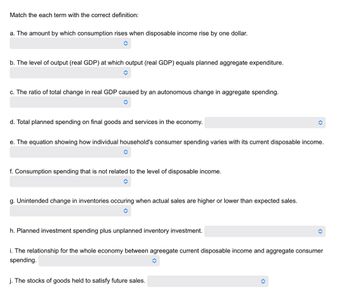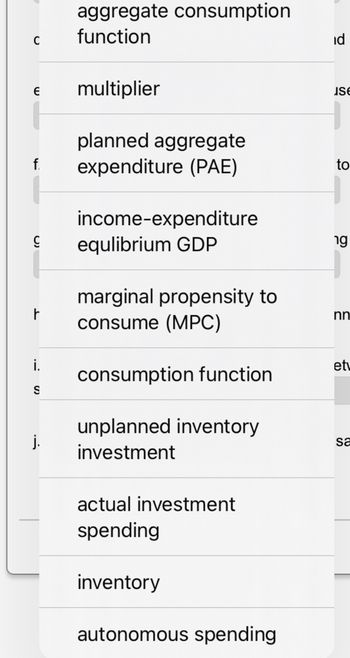
ENGR.ECONOMIC ANALYSIS
14th Edition
ISBN: 9780190931919
Author: NEWNAN
Publisher: Oxford University Press
expand_more
expand_more
format_list_bulleted
Question
Match the following terms ( terms are labeled 1-10 )to the correct definition(definitions are labeled a through J)
aggregate consumption function, multiplier,
planned aggregate expenditure (PAE), income-expenditure equlibrium GDP, marginal propensity to consume (MPC), consumption function, unplanned inventory investment, actual investment spending,inventory, autonomous spending
A) The amount by which consumption rises when disposable income rise by one dollar
marginal propensity to consume (MPC)
B) The level of output (real GDP) at which output (real GDP) equals planned aggregate expenditure.
income-expenditure equlibrium GDP
C) The ratio of total change in real GDP caused by an autonomous change in aggregate spending.
multiplier
D) Total planned spending on final goods and services in the economy.
aggregate consumption function
E) The equation showing how individual household's consumer spending varies with its current disposable income.
consumption function
F) Consumption spending that is not related to the level of disposable income.
autonomous spending
G) Unintended change in inventories occuring when actual sales are higher or lower than expected sales.
unplanned inventory investment
H) Planned investment spending plus unplanned inventory investment.
actual investment spending
I) The relationship for the whole economy between agreegate current disposable income and aggregate consumer spending.
planned aggregate expenditure (PAE)
J) The stocks of goods held to satisfy future sales
inventory
1. aggregate consumption function
2. multiplier
3. planned aggregate expenditure (PAE)
4. income-expenditure equlibrium GDP
5. marginal propensity to consume (MPC)
6. consumption function
7. unplanned inventory investment
8. actual investment spending
9. inventory
10. autonomous spending

Transcribed Image Text:Match the each term with the correct definition:
a. The amount by which consumption rises when disposable income rise by one dollar.
b. The level of output (real GDP) at which output (real GDP) equals planned aggregate expenditure.
c. The ratio of total change in real GDP caused by an autonomous change in aggregate spending.
d. Total planned spending on final goods and services in the economy.
=
e. The equation showing how individual household's consumer spending varies with its current disposable income.
f. Consumption spending that is not related to the level of disposable income.
g. Unintended change in inventories occuring when actual sales are higher or lower than expected sales.
h. Planned investment spending plus unplanned inventory investment.
i. The relationship for the whole economy between agreegate current disposable income and aggregate consumer
spending.
j. The stocks of goods held to satisfy future sales.

Transcribed Image Text:aggregate consumption
C
function
Є
multiplier
f.
planned aggregate
expenditure (PAE)
income-expenditure
equlibrium GDP
marginal propensity to
id
se
to
ng
r
consume (MPC)
nn
i.
consumption function
et
S
unplanned inventory
investment
actual investment
spending
inventory
autonomous spending
sa
Expert Solution
This question has been solved!
Explore an expertly crafted, step-by-step solution for a thorough understanding of key concepts.
Step by stepSolved in 4 steps with 1 images

Knowledge Booster
Learn more about
Need a deep-dive on the concept behind this application? Look no further. Learn more about this topic, economics and related others by exploring similar questions and additional content below.Similar questions
- Consider a national income model as: Y= C + I0 + G Y= National Income C= (Planned) Consumption Expenditure I0= Investment G= Government Expenditure Consider Y= 20trillion, G= 4.2trillion, I0= 3.8 trillion. Explain the key elements missing from the National Income model. Add a new endogenous variable to represent that missing element or endogenize one of the exogenous variables to address this issue. C= a+ b(Y-T0) (a>0, 0<b<1) G= gY (0<g<1)arrow_forwardWhat is Aggregate Demand (AD), making sure to list its spending components, and explain why is AD curve downward sloping? (11.2)arrow_forwardGive me proper answer with calculation and full explanation otherwise i give multiple downvote Note:- Please avoid using ChatGPT and refrain from providing handwritten solutions; otherwise, I will definitely give a downvote. Also, be mindful of plagiarism. Answer completely and accurate answer. Rest assured, you will receive an upvote if the answer is accurate.arrow_forward
- Questions attached belowarrow_forwardShow full answers to the questions and steps to this exercisearrow_forwardThe graph in Figure I presents the annual GDP growth rate of the United States economy since the first quarter of 2004, while the graphs in Figure II represent three different scenarios of the relationship. between aggregate demand and supply that reflect different situations of economic growth. Answer the following questions in detail. Using the shifts in the aggregate demand curve in each of the three graphs in Figure II, explain the function of aggregate consumption and investment. Explain in detail what is happening in Graph A in Figure II and, after examining the data in the graph in Figure I, identify in what period of time said situation is occurring.arrow_forward
- 0 $75 150 225 Investment ($) Price Level AS Q₁ Real GDP Investment Demand $50 100 150 Investment ($) AD, (/=$50) Z AD, (/=$150) -AD, (/=$100) Refer to the above diagrams, in which the numbers in parentheses near the AD1, AD2, and AD3 labels indicate the level of investment spending associated with each curve. All figures are in billions. The economy is at point Y on the investment demand curve. Given these conditions, what policy should the Fed pursue to achieve a noninflationary full-employment level of real GDP? 10 S 12 11 13 of 26 ‒‒‒ View previous att Next >arrow_forwardThe marginal propensity to consume is defined as: Question 64 options: the ratio of change in consumption on both domestic and foreign items to the change in income average consumption as a proportion of income the ratio of the change in consumption on domestic items to the change in income the change in consumption on domestic items multiplied by the change in income the change in consumption on domestic and foreign items multiplied by the change in incomearrow_forwardAssume that specific functional forms are assumed for the consumption function and the investment demand function: C = c1(Y; – G;) + c2(Y;+1- G++1) – C3ri I = -dır: + d2At+1+ d3Kt Where c1, C2, c3, di, dzand d3are fixed parameters governing the sensitivity of consumption and investment to different relevant decision factors. a) Find an algebraic expression of the IS (Investment-Savings) curve. b) Use the above expression to find the slope of the IS curve. C) Assume that the parameter values are: C1 = 0.6, c2 = 0.5, c3 = 10, dı = 20, d2 = 1 and d3 = 0.5. Assume that Yt+1 = 15, Gt = 10, Gt+1 = 10, At+1 = 5 and Kt = 15. Assume that rt = 0.1. Find the product in the current period. d) Now suppose ri = 0.15. Find the product Y in the current period. (e) Create a range of values of r, between 0.01 to 0.2, with 0.001 intervals between values. Find Y for each r:using an Excel sheet and draw the IS curve. Does it have the expected slope? Comment f) Find another version of the IS curve with A…arrow_forward
- Consider an economy characterized by the following equations: C=750 +0.75Y+0.05W 1 = 250 where C is desired consumption, I is desired investment, W is household wealth, and Y is national income. a. Suppose wealth is constant at W = 12,000. Use the line drawing tool to draw and label the aggregate expenditure function on a scale diagram along with the 45° line to the right. Make sure that the line starts at y-axis and extends to the right. Carefully follow the instructions above, and only draw the required objects. Desired Aggregate Expenditures Aggregate Expenditure and Equilibrium 10,000- 9,000- 8,000- 7,000- 6,000- 5,000- 4,000- 3,000+ 2,000- 1,000+ 0- 0 45 line 2,000 4,000 6,000 8,000 10,000 Actual National Incomearrow_forwardIn the aggregate expenditures model, all are true except: a)the price level is shown b)the equilibrium level of GDP can be determined c)the relationship between spending and production is presented d)the actual GDP can be compared to potential GDParrow_forwardall subparts please thank youarrow_forward
arrow_back_ios
SEE MORE QUESTIONS
arrow_forward_ios
Recommended textbooks for you

 Principles of Economics (12th Edition)EconomicsISBN:9780134078779Author:Karl E. Case, Ray C. Fair, Sharon E. OsterPublisher:PEARSON
Principles of Economics (12th Edition)EconomicsISBN:9780134078779Author:Karl E. Case, Ray C. Fair, Sharon E. OsterPublisher:PEARSON Engineering Economy (17th Edition)EconomicsISBN:9780134870069Author:William G. Sullivan, Elin M. Wicks, C. Patrick KoellingPublisher:PEARSON
Engineering Economy (17th Edition)EconomicsISBN:9780134870069Author:William G. Sullivan, Elin M. Wicks, C. Patrick KoellingPublisher:PEARSON Principles of Economics (MindTap Course List)EconomicsISBN:9781305585126Author:N. Gregory MankiwPublisher:Cengage Learning
Principles of Economics (MindTap Course List)EconomicsISBN:9781305585126Author:N. Gregory MankiwPublisher:Cengage Learning Managerial Economics: A Problem Solving ApproachEconomicsISBN:9781337106665Author:Luke M. Froeb, Brian T. McCann, Michael R. Ward, Mike ShorPublisher:Cengage Learning
Managerial Economics: A Problem Solving ApproachEconomicsISBN:9781337106665Author:Luke M. Froeb, Brian T. McCann, Michael R. Ward, Mike ShorPublisher:Cengage Learning Managerial Economics & Business Strategy (Mcgraw-...EconomicsISBN:9781259290619Author:Michael Baye, Jeff PrincePublisher:McGraw-Hill Education
Managerial Economics & Business Strategy (Mcgraw-...EconomicsISBN:9781259290619Author:Michael Baye, Jeff PrincePublisher:McGraw-Hill Education


Principles of Economics (12th Edition)
Economics
ISBN:9780134078779
Author:Karl E. Case, Ray C. Fair, Sharon E. Oster
Publisher:PEARSON

Engineering Economy (17th Edition)
Economics
ISBN:9780134870069
Author:William G. Sullivan, Elin M. Wicks, C. Patrick Koelling
Publisher:PEARSON

Principles of Economics (MindTap Course List)
Economics
ISBN:9781305585126
Author:N. Gregory Mankiw
Publisher:Cengage Learning

Managerial Economics: A Problem Solving Approach
Economics
ISBN:9781337106665
Author:Luke M. Froeb, Brian T. McCann, Michael R. Ward, Mike Shor
Publisher:Cengage Learning

Managerial Economics & Business Strategy (Mcgraw-...
Economics
ISBN:9781259290619
Author:Michael Baye, Jeff Prince
Publisher:McGraw-Hill Education